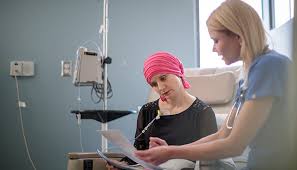
Most patients with stage 4 lung cancer have disease that has already spread and cannot be removed with surgery, so systemic treatment that can kill cancer cells throughout the body is necessary. Treatment focuses on extending life and maintaining quality of life.
Your treatment plan is guided by many factors, including which type of lung cancer you have:
- The biology of the tumor (characteristics of the cancer cells)
- Where the cancer has spread
- Your symptoms
- Personal goals and preferences
Systemic treatment is called chemotherapy. Chemotherapy can also destroy cancer cells that have metastasized to parts of the body away from the original tumor site. Combining two or more chemotherapy agents can be used for treatment of breast cancer, as this will help to provide a better response overall.
Chemotherapy schedule
Chemotherapy is usually given over 3-6 months. It’s given in cycles, with days or weeks off between treatments. This gives your body a chance to recover.
Most chemotherapy is given by IV through a vein and you will usually need to have a port placed. Some chemotherapy treatment is in pill form and can be taken orally.
Your schedule depends on the combination of drugs used for treatment.
Chemotherapy drugs for small cell lung cancer
Initial chemotherapy for almost all patients with small cell lung cancer includes the combination of the drug etoposide with a platinum agent (either cisplatin or carboplatin).
Chemotherapy drugs for non small cell lung cancer?
The chemo drugs most often used for NSCLC include:
- Cisplatin
- Carboplatin
- Paclitaxel (Taxol)
- Albumin-bound paclitaxel (nab-paclitaxel, Abraxane)
- Docetaxel (Taxotere)
- Gemcitabine (Gemzar)
- Vinorelbine (Navelbine)
- Etoposide (VP-16)
- Pemetrexed (Alimta)
Advanced lung cancer may be treated with a single chemo drug. If someone may not tolerate combination chemotherapy, the elderly, or someone has poor overall health using a single agent may be suggested.
Sometimes chemotherapy and other treatments can cause side effects. Visit our EASE page to discover helpful hints on how to deal with the possible aftermath of treatment.
Chemotherapy can also be used in combination with immuno-oncology or immunotherapy and some advanced lung b benefit from therapy or a combination of therapies.




